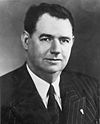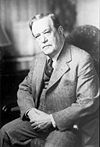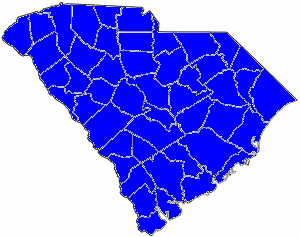
United States Senate election in South Carolina, 1944
Encyclopedia

United States Senate
The United States Senate is the upper house of the bicameral legislature of the United States, and together with the United States House of Representatives comprises the United States Congress. The composition and powers of the Senate are established in Article One of the U.S. Constitution. Each...
from the state of South Carolina
South Carolina
South Carolina is a state in the Deep South of the United States that borders Georgia to the south, North Carolina to the north, and the Atlantic Ocean to the east. Originally part of the Province of Carolina, the Province of South Carolina was one of the 13 colonies that declared independence...
. Incumbent Democratic
Democratic Party (United States)
The Democratic Party is one of two major contemporary political parties in the United States, along with the Republican Party. The party's socially liberal and progressive platform is largely considered center-left in the U.S. political spectrum. The party has the lengthiest record of continuous...
Senator Ellison D. Smith
Ellison D. Smith
Ellison DuRant "Cotton Ed" Smith was a Democratic Party politician from the U.S. state of South Carolina. He represented South Carolina in the United States Senate from 1909 until 1944....
was defeated in the Democratic primary by Governor
Governor of South Carolina
The Governor of the State of South Carolina is the head of state for the State of South Carolina. Under the South Carolina Constitution, the Governor is also the head of government, serving as the chief executive of the South Carolina executive branch. The Governor is the ex officio...
Olin D. Johnston
Olin D. Johnston
Olin DeWitt Talmadge Johnston was a Democratic Party politician from the US state of South Carolina. He served as the 98th Governor of South Carolina, 1935–1939 and 1943–1945, and represented the state in the United States Senate from 1945 until his death in 1965.-Early Life, Military Involvement,...
. The general election was contested, but a victory by Johnston was never in doubt.
Democratic primary
By 1944, Ellison D. SmithEllison D. Smith
Ellison DuRant "Cotton Ed" Smith was a Democratic Party politician from the U.S. state of South Carolina. He represented South Carolina in the United States Senate from 1909 until 1944....
had served 35 years in the Senate and was approaching his 80th birthday. He was an ardent foe of the New Deal
New Deal
The New Deal was a series of economic programs implemented in the United States between 1933 and 1936. They were passed by the U.S. Congress during the first term of President Franklin D. Roosevelt. The programs were Roosevelt's responses to the Great Depression, and focused on what historians call...
in the Senate and opposed almost every policy of President Roosevelt
Franklin D. Roosevelt
Franklin Delano Roosevelt , also known by his initials, FDR, was the 32nd President of the United States and a central figure in world events during the mid-20th century, leading the United States during a time of worldwide economic crisis and world war...
. His opponent in the previous Senate election
United States Senate election in South Carolina, 1938
The 1938 South Carolina United States Senate election was held on November 8, 1938 to select the U.S. Senator from the state of South Carolina. Incumbent Democratic Senator Ellison D. Smith defeated Governor Olin D. Johnston in the Democratic primary. The general election was contested, but a...
was Governor
Governor of South Carolina
The Governor of the State of South Carolina is the head of state for the State of South Carolina. Under the South Carolina Constitution, the Governor is also the head of government, serving as the chief executive of the South Carolina executive branch. The Governor is the ex officio...
Olin D. Johnston
Olin D. Johnston
Olin DeWitt Talmadge Johnston was a Democratic Party politician from the US state of South Carolina. He served as the 98th Governor of South Carolina, 1935–1939 and 1943–1945, and represented the state in the United States Senate from 1945 until his death in 1965.-Early Life, Military Involvement,...
, who challenged him once again in the Democratic primary. While Johnston was fully supportive of the New Deal in 1938, he had moderated his position towards Roosevelt's domestic policies in 1944.

Supreme Court of the United States
The Supreme Court of the United States is the highest court in the United States. It has ultimate appellate jurisdiction over all state and federal courts, and original jurisdiction over a small range of cases...
had decided early in the year in the case Smith v. Allwright
Smith v. Allwright
Smith v. Allwright , 321 U.S. 649 , was a very important decision of the United States Supreme Court with regard to voting rights and, by extension, racial desegregation. It overturned the Democratic Party's use of all-white primaries in Texas, and other states where the party used the...
that primary election
Primary election
A primary election is an election in which party members or voters select candidates for a subsequent election. Primary elections are one means by which a political party nominates candidates for the next general election....
s must be open to all, regardless of race. Johnston, as governor, had called the General Assembly
South Carolina General Assembly
The South Carolina General Assembly, also called the South Carolina Legislature, is the state legislature of the U.S. state of South Carolina. The legislature is bicameral and consists of the lower South Carolina House of Representatives and the upper South Carolina Senate. Altogether, the General...
into session to make the South Carolina Democratic Party
South Carolina Democratic Party
The South Carolina Democratic Party is the South Carolina affiliate of the United States Democratic Party. The Democratic party thrived during the Second Party System between 1832 and the mid-1850s and was one of the causes of the collapse of the Whig Party....
a private club so that it could restrict its primaries to white voters. Thus on the campaign trail Johnston was able to prove to the voters that he had acted during a time of crisis to save the Democratic primary from the blacks. Furthermore, Johnston's youthful appearance contrasted sharply with Smith's aged and tired persona. The voters were shocked when Smith failed to deliver a full speech and instead played a recording of a speech he had made six years prior.
| Democratic Primary | ||
|---|---|---|
| Candidate | Votes | % |
General election campaign
Winning the Democratic primary was tantamount to winning the general election, so Johnston was virtually assured of becoming the next Senator from South Carolina. The South Carolina Republican PartySouth Carolina Republican Party
The South Carolina Republican Party and the South Carolina Democratic Party are the two major political parties within the U.S. state of South Carolina...
was controlled by the white faction and they nominated James B. Gaston as their candidate. The Tolbert black and tan faction was rebuffed by the national Republican Party
Republican Party (United States)
The Republican Party is one of the two major contemporary political parties in the United States, along with the Democratic Party. Founded by anti-slavery expansion activists in 1854, it is often called the GOP . The party's platform generally reflects American conservatism in the U.S...
, but they proceeded to nominate B.L. Hendrix for the election. Many of the black civil rights leaders of the state decided to form their own political party in response to the state Democratic party becoming a private entity. Their party, called the Progressive Democratic Party
Progressive Democratic Party (South Carolina)
The Progressive Democratic Party was a political party in South Carolina in the 1940s. It was founded in 1944 by John Henry McCray, editor of the black newspaper The Lighthouse and Informer, to provide an organization to galvanize blacks to register and vote...
, nominated Osceola E. McKaine for the Senate election with the sole purpose of motivating blacks in the state to register and vote.
General election results
|-| bgcolor="#00FFFF" |
| Progressive Democratic
Progressive Democratic Party (South Carolina)
The Progressive Democratic Party was a political party in South Carolina in the 1940s. It was founded in 1944 by John Henry McCray, editor of the black newspaper The Lighthouse and Informer, to provide an organization to galvanize blacks to register and vote...
| Osceola E. McKaine
| align="right" | 3,214
| align="right" | 3.2
| align="right" | +3.2
|-
| bgcolor="#FF3333" |
| Republican
Republican Party (United States)
The Republican Party is one of the two major contemporary political parties in the United States, along with the Democratic Party. Founded by anti-slavery expansion activists in 1854, it is often called the GOP . The party's platform generally reflects American conservatism in the U.S...
(Tolbert)
| B.L. Hendrix
| align="right" | 141
| align="right" | 0.1
| align="right" | N/A
|-
| colspan=5 |Democratic
Democratic Party (United States)
The Democratic Party is one of two major contemporary political parties in the United States, along with the Republican Party. The party's socially liberal and progressive platform is largely considered center-left in the U.S. political spectrum. The party has the lengthiest record of continuous...
hold
|-

See also
- List of United States Senators from South Carolina
- United States Senate elections, 1944
- United States House of Representatives elections in South Carolina, 1944United States House of Representatives elections in South Carolina, 1944The 1944 South Carolina United States House of Representatives elections were held on November 7, 1944 to select six Representatives for two-year terms from the state of South Carolina. All five incumbents who ran were re-elected and the open seat in the 2nd congressional district was retained by...

